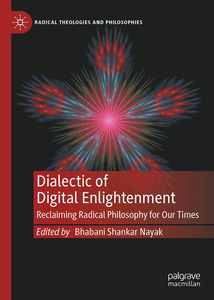Nayak, Bhabani Shankar (2025) Dialectic of digital enlightenment: reclaiming radical philosophy for our times. Radical Theologies and Philosophies (RADT) . Palgrave, New York. ISBN 978-3-031-95469-6 (e-book), 978-3-031-95468-9 (Hardcover), 978-3-031-95471-9 (Softcover)
From Kant and Hegel to Habermas and Marx, radical philosophical transformation has been marked by technological advancements at every stage of human life. The volume on the dialectic of digital enlightenment engages with AI-driven technological changes to explore the transformation of human nature, society, the state, and government through the philosophical perspectives of Kant, Hegel, Horkheimer, Adorno, Bloch, Benjamin, Fromm, Marcuse, Habermas and Marx. Digital transformation has also been witnessing the rise of authoritarianism, militarism, economic disruption, environmental crises, and the impoverishment of collective foundations of mass culture through consumerism, where the ideals of utility, pleasure, and satisfaction reign supreme in the atomised lives of individuals, both within and beyond the digital sphere. This trend continues to hinder the growth of collective consciousness necessary for social, political, economic, and cultural transformation. Multiple forms of inequality and exploitation based on class, gender, race, caste, sexuality, and other forms of marginalisation continue to define the inherent crises of digital civilisation, which is shaped by rent-seeking nature of capitalism with its techno-feudal characteristics. Therefore, the dialectic of digital enlightenment argues that capitalism has undermined the potential for a progressive digital civilisation grounded in peace and prosperity for all without any form of inequalities, exploitation and barriers.
Historically, the 19th century retrospective invention of the European Enlightenment not only consolidated capitalism but also undermined diverse knowledge traditions within and beyond Europe. Similarly, digital enlightenment follows in the footsteps of the European Enlightenment, eroding the creative potential of labour and its collective foundations in the name of digital revolution. Such trends create favorable conditions for capitalist consolidation, often at the expense of people and the planet. So, there is a pressing need for a radical reassessment and decolonisation of AI-driven Eurocentric technological transformations to ensure a digital civilisation free from alienation, grounded in the collective foundations of human life and consciousness.
The ten chapters in this volume explore various themes, including Kantian Idealism and AI, Hegelian Dialectics and Digital Society, Max Horkheimer in the Age of Digital Revolution, Theodor W. Adorno and Limits of Digital Positivism, Technological Society and Hopes of Ernst Simon Bloch, Walter Benjamin and Art in the Age of Mechanical Reproduction, Erich Fromm and Digital Human Nature, Herbert Marcuse and Eros of Digital Civilisation, Habermas, Reason and AI, Marx and Class Consciousness in the Age of Digital Work. The volume aims to free these eleven European philosophers from the prison of Eurocentric knowledge traditions and its universalistic tendencies, which dominate the world and undermine these European philosophers, whose philosophies appeal to all human beings across the globe.
 |
View Item |
 Lists
Lists Lists
Lists![978-3-031-95468-9.jpg [thumbnail of 978-3-031-95468-9.jpg]](https://repository.londonmet.ac.uk/9941/1.hassmallThumbnailVersion/978-3-031-95468-9.jpg)
